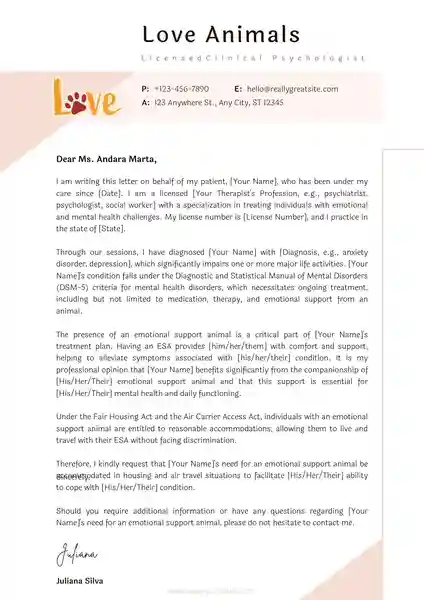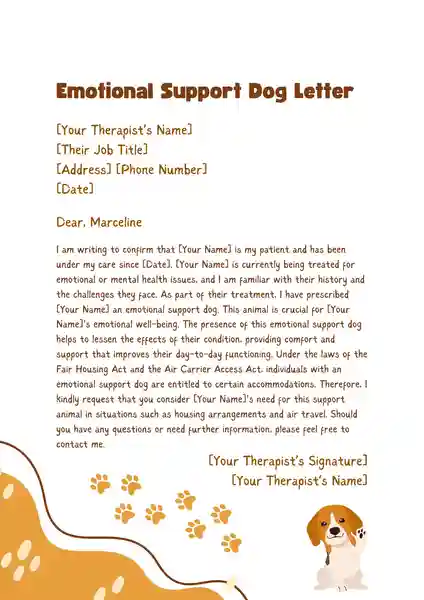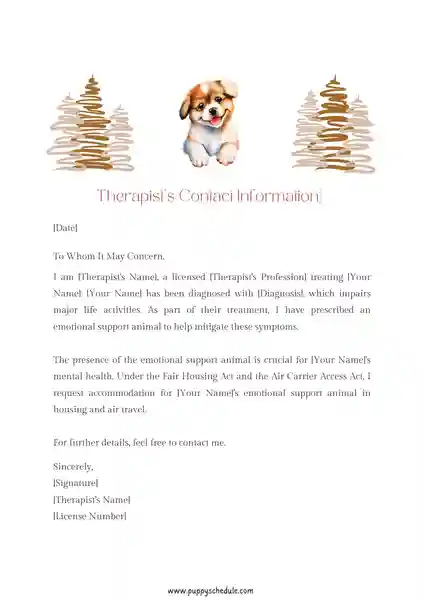Free emotional support dog letter template! Having an emotional support dog can make a big difference in your life. These special pets help us feel better when we’re sad or worried. But to take them to certain places, you might need a special letter. This letter is called an Emotional Support Dog Letter. Let’s talk about how to write this letter and make it easy to read and understand.
What is an Emotional Support Dog Letter?
An Emotional Support Dog Letter is a note from a doctor or therapist. It says that your dog helps with your feelings and that you need it with you. This letter can help you take your dog to places where pets usually can’t go, like some apartments or on an airplane.
Why Do You Need an Emotional Support Dog Letter?
Imagine you have a special key. This key can open doors that usually stay locked. For people who have emotional support dogs, this special key is an Emotional Support Dog Letter. Let’s see why this letter is super important:
- More Than a Pet: This letter is like a gold star for your dog. It tells everyone that your dog is not just for play; it helps you feel better. Your dog is like a superhero for your feelings. The letter says your dog helps you stay calm and happy.
- Say Goodbye to “No Pets Allowed”: Lots of places where people live have rules that say “no pets.” But with your special letter, these places have to let you live there with your dog. It’s like the letter has a magic word that opens up these homes for you and your dog. This means you and your dog can stay together, making you feel safe and loved.
- No More Trouble on Planes: Going on a plane can be hard, especially if you need your dog to feel calm. Some airlines ask for extra money to bring pets, or they might not let pets on the plane. But if you have your emotional support letter, the airline lets your dog come with you, sitting right by your side. No extra money needed. It’s like your dog gets a VIP ticket to be with you, making the trip much nicer.
Who can write an Emotional Support Dog Letter?
Here are the kinds of professionals who can write this important letter:
- Psychiatrists: These are doctors who know a lot about mental health. They can give medicine and advice to help people feel better.
- Psychologists: Psychologists are like detectives for thoughts and feelings. They talk to you and can help you understand why you feel a certain way. They use talking and games to help you feel better.
- Licensed Clinical Social Workers (LCSWs): These people are like guides. They help you through tough times, like if you’re feeling very sad or have big problems at home.
- Licensed Professional Counselors (LPCs): LPCs are friends you can talk to. They listen to your worries and help you find ways to feel happier and less stressed.
- Licensed Mental Health Counselors (LMHCs): Very similar to LPCs, these coaches talk with you to help you deal with your feelings.
What Makes Them Qualified?
These professionals are qualified because:
- Education: They have gone to school for many years to learn about mental health.
- License: They have passed tests that allow them to help people with their mental health legally.
- Experience: They have worked with many people, helping them through different emotional challenges.
Why Their Approval Matters?
Their approval is important because:
- Trust: They know you well and understand your need for an emotional support dog.
- Legality: Their letter shows that your need for an emotional support dog is real and protected by law.
- Support: They can explain how the dog helps you in ways that others might not understand.
Steps to Getting an Emotional Support Dog Letter
Getting an Emotional Support Dog Letter involves a few steps. Let’s see how it works:
1. Find a Professional
First, you need to find the right helper. This person should be a licensed mental health professional, like a psychiatrist, psychologist, or counselor. Here’s how to start:
- Ask for Recommendations: Sometimes, friends, family, or your regular doctor can suggest a good professional.
- Search Online: Look up mental health professionals in your area. Many websites let you search based on what you need help with.
- Check Credentials: Make sure they are licensed to practice in your state and have experience with emotional support animals.
Once you find a professional, you’ll have a meeting, called a session. Here, you get to talk about:
- Your Feelings: Share what you’re going through, like feeling very sad, anxious, or lonely.
- Your Dog’s Role: Explain how your dog helps you feel better. Maybe you feel calmer or not so alone when your dog is with you.
This step is important because it helps the professional understand your situation better.
3. Get Evaluated
During your talks, the professional will:
- Ask Questions: They might ask about your daily life, how you feel in different situations, and how your dog helps with those feelings.
- Understand Your Needs: This helps them see if an emotional support dog is a good way to help you feel better.
This step is like putting together a puzzle. It helps the professional see the whole picture of your emotional health.
4. Letter Writing
If your mental health professional agrees that an emotional support dog is good for your health, they will write the letter. Here’s what happens:
- Writing the Letter: They will use a special format that includes their license information, how they know you, and why they believe an emotional support dog is necessary for your mental health.
- Official Details: The letter will have the date, their signature, and contact information.
What Happens Next?
After you get your Emotional Support Dog Letter, you can use it to:
- Apply for Housing: Show your letter to landlords to help you live with your emotional support dog.
- Travel Together: Airlines will ask to see this letter if you want your dog to fly with you in the cabin.
Common Mistakes and How to Avoid Them
Writing an Emotional Support Dog Letter is a critical step. However, some mistakes can make the letter less effective or even lead to it being rejected. these common mistakes and how to avoid them:
Not Using a Qualified Professional
Mistake: Getting a letter from someone who is not a licensed mental health professional.
How to Avoid: Ensure the letter is written by a qualified mental health professional.
Lacking Specific Details
Mistake: The letter is too vague, missing details about your condition and how your dog helps you cope.
How to Avoid: The person writing your letter should talk about your feelings and how your dog helps you. They can even share stories where your dog made a big difference.
Outdated Information
Mistake: Using a letter that’s old or not up-to-date, which can lead to questions about its current relevance.
How to Avoid: Ensure the letter is recent, typically within the last year. This shows that the need for an emotional support dog is an ongoing requirement for your mental health.
Missing Professional Credentials
Mistake: The letter doesn’t include the mental health professional’s credentials, license number, and contact information.
How to Avoid: The letter should have all the doctor’s official info like their full name, their special badge number, and how to contact them.etter.
Generic Template
Mistake: Using a generic template found online that doesn’t reflect your personal situation
How to Avoid: Your letter should be about you and your dog. The doctor should write it just for you, talking about how your dog helps you.
Lack of Signature
Mistake: The letter is not signed by the mental health professional
How to Avoid: The doctor should sign the letter, making it official.
Getting this letter is super important for you and your dog. Avoiding these oopsies means you can show everyone how your dog is a big help to you. Always make sure everything in your letter is just right!
Do You Need to Update Your Emotional Support Dog Letter?
Yes, you do need to update your Emotional Support Dog Letter from time to time.
Why Update Your Letter?
- Keep It Current: Updating your letter makes sure it matches how you’re feeling now and that you still need your dog’s help. This is super important if you’re moving to a new place or flying with your dog.
- Follow the Rules: Some places like airlines or apartment buildings have rules about how old your letter can be. They might want it to be no older than a year to make sure it’s still true.
- Show Any Changes: How you feel and how your dog helps you might change over time. A new letter can talk about any new ways your dog is helping you.
How to Get Your Letter Updated
- Book a Chat: Set up a time to talk with the doctor or counselor who knows you and your dog best. Do this before your old letter runs out of time.
- Talk About What’s New: Tell them about anything new with your feelings or how your dog is helping you more or in different ways now.
- Get Your New Letter: If they agree that your dog is still a big help, they’ll write you a new letter that talks about how things are now.
So, don’t forget to check your letter and keep it update!
Can Landlords Say No to Your Helper Dog?
Most times, if you have a special note for your helper dog, landlords can’t say no. This note is from a doctor who knows a lot about feelings and is very important.
What is the Fair Housing Act (FHA)
- What This Rule Does: This rule helps people with helper dogs live in places that usually say no to pets. It makes sure everyone is treated nicely.
- What is a Disability: If doing everyday things is hard because of challenges in your mind or body, and your dog helps you, this rule is like a friend helping you out.
What Should Your Note Say?
Your note needs to:
- Be from a real feelings doctor.
- Say clearly that you need your dog because of challenges in your feelings or mind.
When Can Landlords Say No?
Landlords can only say no for big reasons:
- If Your Dog is Very Big or a Scary Breed: If your dog is too big or a kind that makes people worried, a landlord might have a reason to say no.
- If Your Dog Costs Them a Lot: If having your dog around makes things very expensive or hard for the landlord, they might say no.
- If Your Dog Could Be Dangerous: If there’s a real worry your dog could hurt someone and it can’t be fixed, then the landlord might say no.
What to Do If a Landlord Says No
If a landlord won’t let your helper dog stay even with your note, you can:
- Show Your Note: Give them your Helper Dog Note and any other info they need.
- Explain the Rules: Sometimes landlords need help understanding the rules about helper dogs. Telling them what the rules say can help.
- Ask for Help: If you feel the landlord is being unfair, you can talk to a special department called HUD or get help from a lawyer.
Landlords should let your helper dog stay with you if you have the right note. But if they have a big reason, they might say no. If that happens, showing your note, explaining the rules, and getting help are the best things to do.
Free Emotional Support Dog Letter Template
Here’s a simple way to write your letter. Remember, a doctor or therapist who knows you well should be the one to write it.



An emotional support dog letter template is very helpful for people who have an emotional support dog. Remember, this letter should come from a therapist or doctor who knows you well. Using our simple template and tips can make writing and understanding this letter easier.


